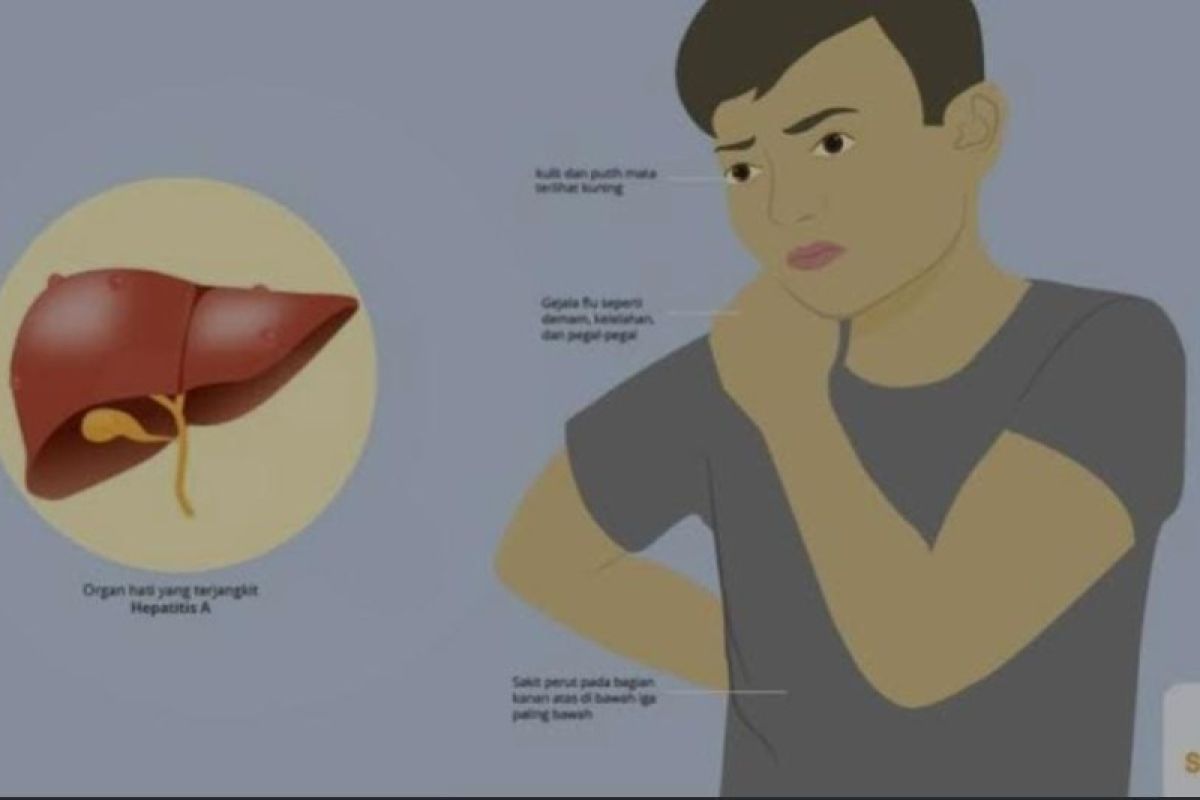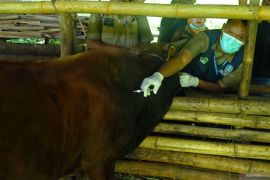There is no need to worry. By God's will, we will accelerate the intervention and localize any reported caseJakarta (ANTARA) - The surfacing of cases of acute hepatitis of unknown cause has become a cause of global concern after the World Health Organization (WHO) declared it as an Extraordinary Event (KLB) on April 15, 2022.
The WHO received 169 cases reported in 12 countries, including Indonesia.
The first case report was received from the United Kingdom (UK) that involved a 10-year-old kid suffering from acute hepatitis of an unknown cause.
In Indonesia, until April 30, 2022, three pediatric patients, with suspected acute hepatitis, reportedly died while being treated at the Cipto Mangunkusumo Hospital, Jakarta.
The cause of this acute hepatitis, which is currently an outbreak, is still unknown. Laboratory testing shows no signs of Hepatitis A, B, C, D, or E viruses that generally cause hepatitis.
However, the molecular test found Adenovirus identified as F type 41 in 74 cases abroad, SARS-CoV-2 in 20 cases, and Adenovirus and SARS-CoV-2 reinfection in 19 cases.
Related news: Jakarta accelerates intervention measures to handle acute hepatitis
Gastrohepatology Consultant Pediatrician Hanifah Oswari noted that there was no correlation between severe acute hepatitis and Adenovirus in the COVID-19 vaccine.
Earlier, the Journal of Hepatology, published on April 21, 2022, wrote a report "Sars-CoV-2 vaccination can cause Hepatitis CD8 T-cell dominant," in which Adenovirus 41 was found in two children, who underwent liver transplantation due to severe acute hepatitis in the United States.
The pediatrician remarked that no corroborating information had yet been received of Adenovirus being directly related to severe acute hepatitis.
"It was still possible that it happened simultaneously but not directly related," he emphasized.
In addition, the Indonesian Pediatrician Association (IDAI) had issued recommendations to handle acute hepatitis of unknown cause that led to severe symptoms in pediatric patients.
Based on the IDAI Recommendation document for Acute Hepatitis Patients in Children published as of April 5, 2022, it is stated that currently, the examination of Hepatitis D and Hepatitis E is not yet widely available in Indonesia.
Related news: Acute hepatitis has no correlation with COVID-19 vaccine: IDAI
Due to these limitations, it is sufficient for initial screening to be checked for Hepatitis A, B, and C. Health workers on duty are also required to report regardless of other causes.
Screening for probable cases of acute hepatitis in children is focused on children under 16 years of age, with an initial diagnosis of jaundice or yellowing of the skin and eyes, acute abdominal pain, acute diarrhea, nausea or vomiting, decreased consciousness or seizures, lethargy, myalgia, or arthralgia.
Patients with a medical diagnosis similar to these symptoms will be tested for Hepatitis A, B, or C. If the results of the laboratory examination are all negative, then the patient can be categorized as having probable acute hepatitis of an unknown cause.
Later, the patients will be taken into an isolation room to prevent transmission to other people and receive treatment and monitoring from health workers.
Spokesperson of the Health Ministry, Siti Nadia Tarmizi, noted that the ministry had taken several steps to handle the spread of acute hepatitis in Indonesia.
The Health Ministry had conducted an investigation through a complete virus panel examination. The ministry had also appointed Sulianto Saroso Hospital and the Laboratory of the Faculty of Health in University of Indonesia (UI) as referrals facilities to examine the cause of acute hepatitis.
Regional Control
To avoid mysterious hepatitis from spreading to other regions, the Health Ministry, through the Director-General of Disease Prevention and Control, issued Circular Letter Number HK.02.02/C/2515/2022 Concerning Precautions for Finding Cases of Acute Hepatitis of Unknown Etiology on April 27, 2022.
The Circular stipulated that the Regional Government, health service facilities, Port Health Office (KKP), health human resources (HR), and related stakeholders must support the early vigilance of the discovery of cases of acute hepatitis of unknown cause.
Each stakeholder must monitor and report cases of acute jaundice syndrome in the Early Alert and Response System (SKDR), with symptoms marked by discolored skin and sclera and sudden jaundice or yellow and dark urine.
Related news: Be wary of hoaxes related to acute hepatitis: minister
They are also urged to provide Communication, Information, and Education (IEC) to the community as well as make preventive efforts through the implementation of Clean and Healthy Living Behavior (PHBS).
The Ministry of Health urges related parties to inform the public to immediately visit the nearest Health Service Facility (Fasyankes) if they experience jaundice symptoms and build and strengthen surveillance networks across programs and sectors.
Tarmizi said her side is strengthening cross-program and cross-sectoral surveillance in a bid to take immediate action in handling symptoms of acute jaundice and other forms of hepatitis.
In addition, Coordinating Minister for Human Development and Culture, Muhadjir Effendy, remarked that efforts to find several infectious diseases that can likely become endemic in Indonesia were conducted through passive and active methods.
“Passive case finding (is conducted) through receipt of case reports or information from health care facilities, including clinical diagnosis and laboratory confirmation," he noted.
Meanwhile, active case finding will be conducted through field visits to make an epidemiological diagnosis based on a general description of certain infectious diseases that can cause outbreaks.
At the regional level, Head of the Jakarta Health Service, Widyastuti, said that her side has expedited intervention steps by strengthening early vigilance to anticipate the transmission of acute hepatitis of unknown cause in the city.
"There is no need to worry. By God's will, we will accelerate the intervention and localize any reported case," she remarked.
Widyastuti remarked that her side had monitored 17 infectious diseases, including hepatitis, since 2022 that were reported from every hospital or health facility.
She also noted that her side had coordinated with the Health Ministry and professional organizations in compiling guidelines for on-field medical officers to handle this disease.
Her side had also disseminated information on early warning to the heads of hospitals and health centers in Jakarta, including temporary standards, to handle the disease.
Meanwhile, Head of the East Java Health Service, Erwin Astha Triyono, stated that the service has not detected any acute hepatitis cases of unknown origin in the province.
Earlier, 114 cases were found in 18 districts and cities based on the East Java Early Alert and Response System (SKDR) on May 4, 2022. It turned out that those cases were not of acute hepatitis but of acute jaundice syndrome.
SKDR is an application devised to follow up on early findings of a disease that receives data from all health services, he added.
After receiving a report from SKDR, the East Java Health Service verifies the cases, checks their causes, and determines whether they are infectious or non-infectious.
Based on several tests run by the health service, it turns out that they did not find any acute hepatitis in the cases.
Related news: No acute hepatitis cases in East Java: official
One of the signs of acute hepatitis is jaundice, but patients, who contract jaundice, may not necessarily have acute hepatitis since jaundice can be caused by typhus and malaria, among others, Triyono noted.
However, he reminded the public to always be careful, but remain calm and take preventive measures by adopting a Clean and Healthy Lifestyle (PHBS), including frequently washing hands with soap, drinking clean and boiled water, and ensuring their food is clean and fully cooked.
People must also use their own eating utensils, wear masks, maintain distance, and avoid contact with sick people.
"For the time being, do not swim in public swimming pools, do not play on the ground, and avoid touching hand railings, doorknobs, walls, and other things that people often touch," he added.
Related news: Acute hepatitis cases must invite concern: epidemiologist
Related news: Minister confirms 15 suspected cases of acute hepatitis in Indonesia
Editor: Fardah Assegaf
Copyright © ANTARA 2022












